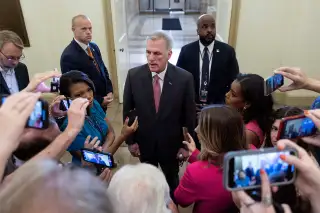The Chances of the U.S. Defaulting on Its Debt Are Surging

The odds of the U.S. government missing its debt ceiling deadline have reached about 25% — and the chances are rising by the day, according to a new estimate by JPMorgan Chase experts.
Officials say the U.S. could become unable to pay its obligations as soon as June 1 unless Congress takes action. That leaves only a week for lawmakers to strike a deal to raise the nation’s $31.4 trillion borrowing limit.
Members of Congress are leaving town Thursday as the House of Representatives recesses for Memorial Day, but debt ceiling negotiations will continue, and lawmakers have been told to be ready to return to the nation's capital immediately in case they need to vote.
JPMorgan Chase economist Michael Feroli wrote in a Wednesday note to clients that there’s a mix of “optimism and pessimism” about the prospects of a deal, but for now, it looks like Congress will figure it out before a default.
“We still think the most likely outcome is a deal signed into law before the X-date,” Feroli said, referring to the date when the government can no longer meet all its financial obligations and must start making decisions on which payments to make and when.
However, time is running out. Feroli stressed that there is a 1-in-4 chance of the government reaching the X-date, which could have potentially severe consequences for the economy.
If no deal is reached, JP Morgan experts say the Treasury Department will likely continue making principal and interest payments on its debt, which would help the country “avoid a technical default.” However, the U.S. credit rating would probably be downgraded, and if the standoff persists to the point where the government does default, the situation would get much worse.
Fitch Ratings put the U.S. on watch Wednesday, warning that the down-to-the-wire negotiations jeopardize the country's current AAA rating (the highest possible).
What it means for you
The U.S. defaulting on its debt would likely be a major blow to the economy.
Some of the potential consequences include a stock market decline, furloughs for government employees, a delay in Social Security payments and disruptions to other government programs that Americans rely on like Medicare, Medicaid and SNAP. Economists say a default could also lead to higher interest rates and higher mortgage rates, which would make the already intense housing market even more difficult for buyers.
5 Ways a U.S. Debt Default Would Impact Your Wallet
Investors Should Brace for ‘Significant Volatility’ as the Debt Ceiling Standoff Continues
A U.S. Debt Default Could Send the Housing Market Into a 'Deep Freeze'